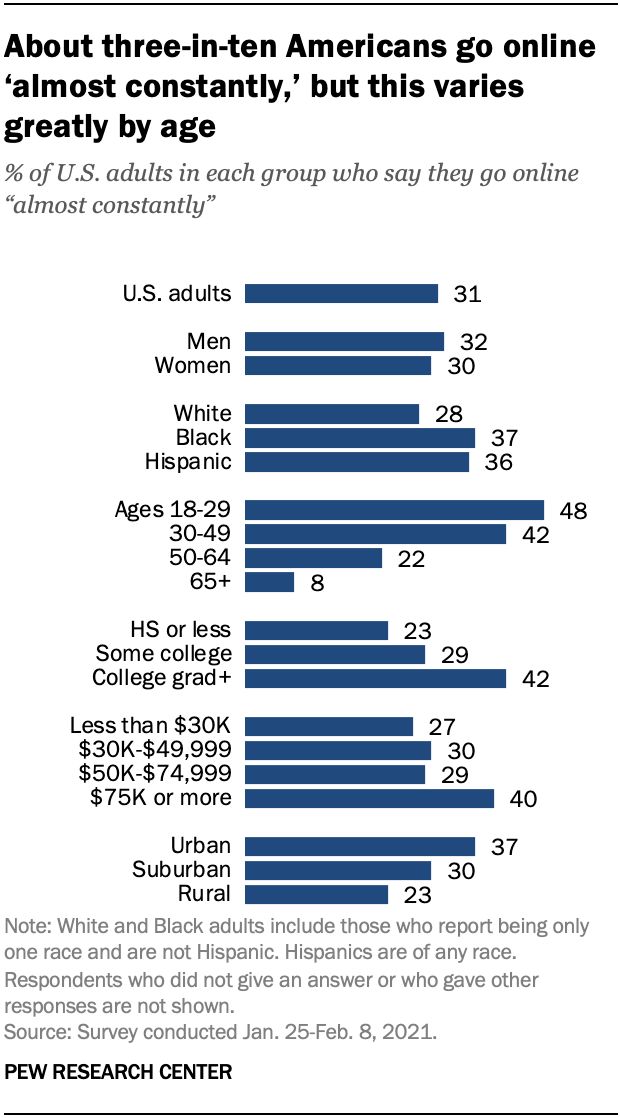In an era when everything we do is based online, it’s easy to forget how much time we’re actually spending connected to the virtual world.
The accessibility and convenience of online activities like social media, information-gathering, dating, gaming, and more, have made it a daily need for some of us. So much so, that 3 in 10 adults are almost constantly online, according to a Pew Research Center study.
Mental Health America reports that 85% of Americans are internet users and 40% of young adults (ages 18-24) use social media in the bathroom.

Image credit: Pew Research
What is internet addiction?
An addiction to being online can come in many forms and can involve any age group. If you feel like you must be online at all times, you are not alone. Some signs to watch for include depression, dishonesty, anxiety, procrastination and avoidance of work.
Types of internet addiction:
- Gaming: You’re so focused on playing online that it impairs other aspects of your life. If you are forgoing sleep regularly, skipping meals, or neglecting relationships, these are telltale signs you might have a gaming addiction.
- Compulsive information seeking: You are on the hunt constantly to find new information. While the quest for learning new items is a noble pursuit, the ease of info the internet provides might be overwhelming. People engaging in this can feel anxious, stressed and tired
- Cyber relationship addiction: When a person is neglecting sleep, obligations or more in pursuit of an online relationship. In turn, a person immersed in this world might have limited social skills, making it easier for them to return to the comfort of online dating.
- Net compulsions: Online behaviors like shopping, gambling and more. On their own, they can be harmless behaviors when done occasionally. However, when they become compulsive, they can lead to financial problems. And with that, comes more stress, making it easier to fall back into this lifestyle.
Recognizing the problem
If you notice you’re losing sleep regularly from being online, or your child has missed school assignments and has withdrawn socially, then it’s a sign that help might be needed. Speak with a therapist who can help you identify the source of the addiction and create a plan to curb internet use. Many workplaces now provide mental health counseling through their insurance programs.
Colleges also have resources for students. And if you do not feel comfortable seeing a therapist in person, resources like BetterHelp allow you to receive assistance from the comfort of your own home.
Mental Health America recommends reviewing the following statements to see if you have an internet addiction.
If you agree with most of these statements, it may be time to seek help:
- I think about being online almost constantly. If I’m not online, I’m thinking about the next time I can be or that last time that I was.
- I need to online longer and longer each time before I feel satisfied.
- I have tried to control, reduce or stop my internet use, but haven’t been able to do so successfully.
- I feel irritable or depressed when I try to reduce the amount of time that I am on the internet or when I can’t get online.
- The way I use the internet has threatened a relationship with someone I care about, my job or my school work.
- I lose track of time when I’m online.
- I sometimes lie to important people in my life about the amount of time I spend or the types of activities I participate in on the Internet.
- Being online helps me to forget about my problems or improve my mood when I’m feeling sad, anxious or lonely.
Tips to treat internet addiction
1. Have a friend or guardian limit your use
As part of your accountability, have someone monitor your online usage. Set boundaries like you can use your smartphone for online activities for 30 minutes twice a day. Along with limiting use, it forces you to alter your schedule and how you communicate with others.
For children under your care, most internet service providers (ISPs) offer security apps to configure child-safe internet filtering.
You can also block websites and keywords you don’t want your child to access, as well as schedule when your child can access the internet.
2. Out of sight, out of mind
Tuck away your smartphone or laptop at a scheduled time every day. By having it out of your sight, it does not mean temptation will not strike. But it does mean you will have time to think about it even if you try to access your device.
3. Keep a journal
Journaling is a convenient way to catalog your thoughts and online behaviors. In moments where you feel tempted to go online, it gives you a distraction from doing so. You can re-read your journal entries to see how you felt in those tempting moments, then share them with your therapist.
4. Pursue other hobbies
You can volunteer to walk dogs, join a social club, or learn to play an instrument. The key is to find activities that prevent you from relying on your smartphone or computer. Not to mention, they’re a fantastic way to socialize, learn a new skill, and give back to your community.
Data caps can be costly
Something to consider if you find yourself constantly accessing the internet, is that some ISPs have data caps, or limits on your monthly usage.
The data caps can be extremely costly if you go over that threshold. Some ISPs charge $10 to $15 per additional 50GB.
The bottom line
Internet addiction is more common than you might think. One in three adults say they are online constantly. This compulsive behavior can lead to anxiousness, a lack of social interest, neglecting duties and more.
If you notice you are struggling to sleep or maintain friendships because your online activities prevent you from doing so, it’s okay to admit you need help. Seek therapy to find solutions that revolve around changing your daily behaviors while also exploring the root cause for them. In turn, you can find ways to reduce your internet use.

Written by:
Sean JacksonContributor
Sean Jackson is a contributor to the Allconnect.com team, focusing on broadband topics. He’s also written broadband and entertainment articles for CNET, TV Guide and other news outlets. Sean enjoys improv, playi…
Read more
Edited by:
Robin LaytonEditor, Broadband Content
-
Featured
![10 tips to shop more safely online and protect your privacy]() 10 tips to shop more safely online and protect your privacy Joe Supan — 6 min read
10 tips to shop more safely online and protect your privacy Joe Supan — 6 min read -
Featured
![Internet safety: Guide to keep your information safe online]() Internet safety: Guide to keep your information safe online Michelle Honeyager — 8 min read
Internet safety: Guide to keep your information safe online Michelle Honeyager — 8 min read -
Featured
![5 of the best parental control apps to keep your children safe online]() 5 of the best parental control apps to keep your children safe online Robin Layton — 2 min read
5 of the best parental control apps to keep your children safe online Robin Layton — 2 min read
Latest
-
Tuesday, April 23, 2024
Worried about losing your TV signal? This is how to keep your satellite dish cleanDavid Anders — 6 min read
-
Tuesday, April 23, 2024
How to change your Wi-Fi network passwordCamryn Smith — 2 min read
-
Tuesday, April 23, 2024
Why your internet bill might increaseAri Howard — 2 min read






